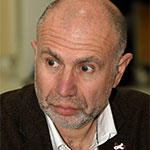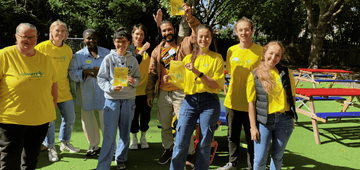
Peter Baker, Director of Global Action on Men’s Health and consultant and trainer for Hampshire County Council’s SBS programme, explores ways community-based initiatives can support men's wellbeing.
Men’s health in Hampshire is being addressed through a new community-based initiative, the Men’s Activity Network. This is part of one of the best-funded men’s health initiatives in the world and, given its scale and potential significance, it merits the attention of the wider public health community.
The Network has been developed by Hampshire County Council Public Health as part of its contribution to the ‘Step by Step’ (SBS) project. Kent County Council is also part of SBS, as are other partner organisations in France, Belgium and the Netherlands.
SBS is supported by more than €2.6 million from the European Regional Development Fund. An evaluation report by researchers at the University of Chichester will be published in 2021. (Encouragingly, early data sets are showing positive results.) It is hoped that the approach will prove suitable for a wider roll-out in the UK and beyond.
The Network utilises a community-empowerment approach that builds on the success of previous male-specific initiatives, in particular men’s sheds. It enables groups where men meet and take part in shared activities (such as sports clubs, music or social groups, faith organisations and sheds) to develop supportive, non-judgemental and ‘male-friendly’ environments where they can talk about their physical and mental health and wellbeing and be encouraged to seek professional help earlier. The Council aims to engage up to 60 local groups by 2021.
A key tool is Making Every Contact Count (MECC). This evidence-based behaviour change methodology takes advantage of the day-to-day interactions that organisations and people have with other people to support them in making positive changes to their physical and mental health and wellbeing. The Five Ways to Wellbeing are also central to the project’s approach.
The need for action to improve men’s health is clear. Hampshire may be a relatively healthy area by UK-wide standards but, according to Public Health Outcomes Framework data, the county’s under 75 mortality rate for cardiovascular and liver diseases is more than twice as high in men as in women.
The under 75 male mortality rates for respiratory disease and cancer are also significantly higher. For suicide, the male rate for all ages is three times the female rate.
The grim statistics that map men’s health have led WHO Europe to publish a men’s health strategy for its 53 member states (which include the UK). The strategy includes a call for an approach that ‘promotes supportive environments and strengthens community development’, a core feature of Hampshire’s intervention.
The Council has developed a broad training and development package for local groups. Group leaders can access one-to-one support to help them grow their organisations and enhance their leadership skills.
There is a separate training programme for group leaders who want to learn more about how to market their organisations in order to recruit new members. Participants learn about developing attention-grabbing posters and flyers and how to use the web and social media effectively.
Group members can also access training to become skills and development coaches and health champions. The role of the skills coach is to provide support to men in their group who want build on their existing work skills or to build new ones. The aim is to give men more confidence to get back into employment, change jobs, or take up volunteering. The rationale for the focus on employment for men who are unemployed or in low-quality jobs is that it can lead to better health outcomes.
The health champion training programme, which aims to work with up to 400 men internationally by 2021, equips champions to initiate conversations about health and wellbeing with men in their groups and to signpost men to professional support when appropriate. It also covers the impact of male gender norms on men’s health and how to take them into account when talking to men.
The project is not without its challenges, however. Whether the Network can recruit the target number of groups and enough skills coaches and health champions remains to be seen. The Network will also need to demonstrate that it is engaging a diverse group of men, that participation leads to improved outcomes, and that it is sustainable without long-term external support.
The Network is very much focused on individual behaviour change and has not yet addressed the underlying social determinants of poor health in men. For this reason, it is important that the SBS project as a whole makes a more strategic impact in the longer-term by, for example, influencing the future development of public health policy.



